‘Months of hell’: Inside Kherson, shellshocked survivors fear what Russia left behind
As locals celebrate a liberated Kherson, the threat from Russian troops left behind looms, Bel Trew reports

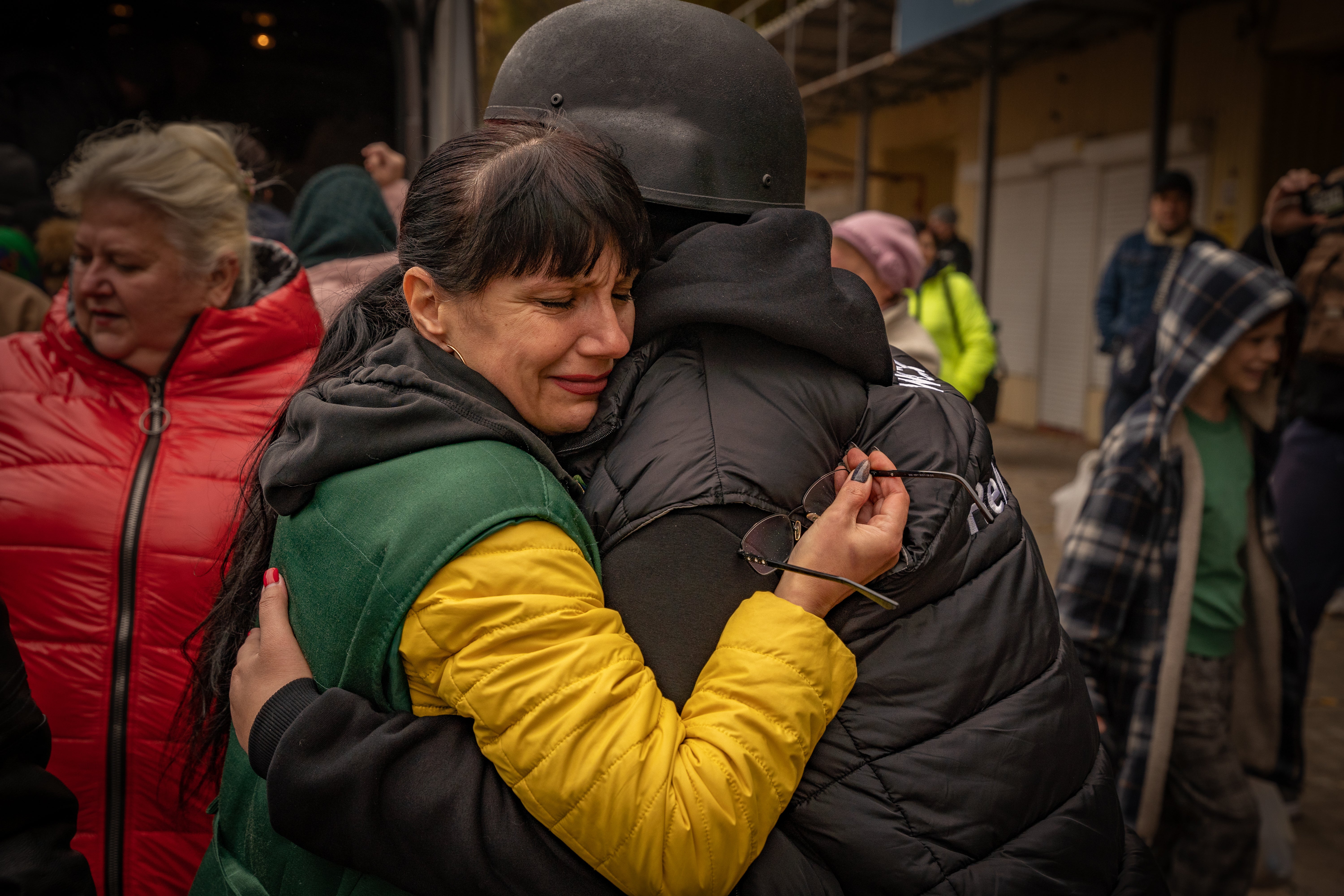
A single bag of food was all it took for the Ukrainian grandmother to stop in her tracks and crumple into tears. Against the haunting boom of shelling, Ludmilla, 76, sobbed as she explained how she had lived through hell for the past eight months.
In May her son was killed in the bombardment of her hometown, Kherson, the last regional capital that Russia occupied until it was forced into an embarrassing retreat this week.
Ludmilla managed to evacuate her daughter-in-law and the grandchildren to Poland, but she stayed in Kherson to look after the family home.
Without electricity, water or gas, and with dwindling food supplies, she limped on in the dark all alone. That was until Ukraine’s soldiers opened the city on Friday to ecstatic crowds.
“God bless you; I haven’t had a decent meal in months,” she told the staff of global food charity World Central Kitchen, who on Sunday were handing out hundreds of emergency food packets to crowds in the centre of the recently liberated city.
Each packet, containing tinned meat, fish, vegetables and basic foodstuffs, is a lifeline. People described food prices tripling under occupation and supplies running out.
“It’s been months of hell,” Ludmilla continued, clutching her parcel of food like a lifebuoy.
“At night the bombing was so loud. And still there is shelling.”
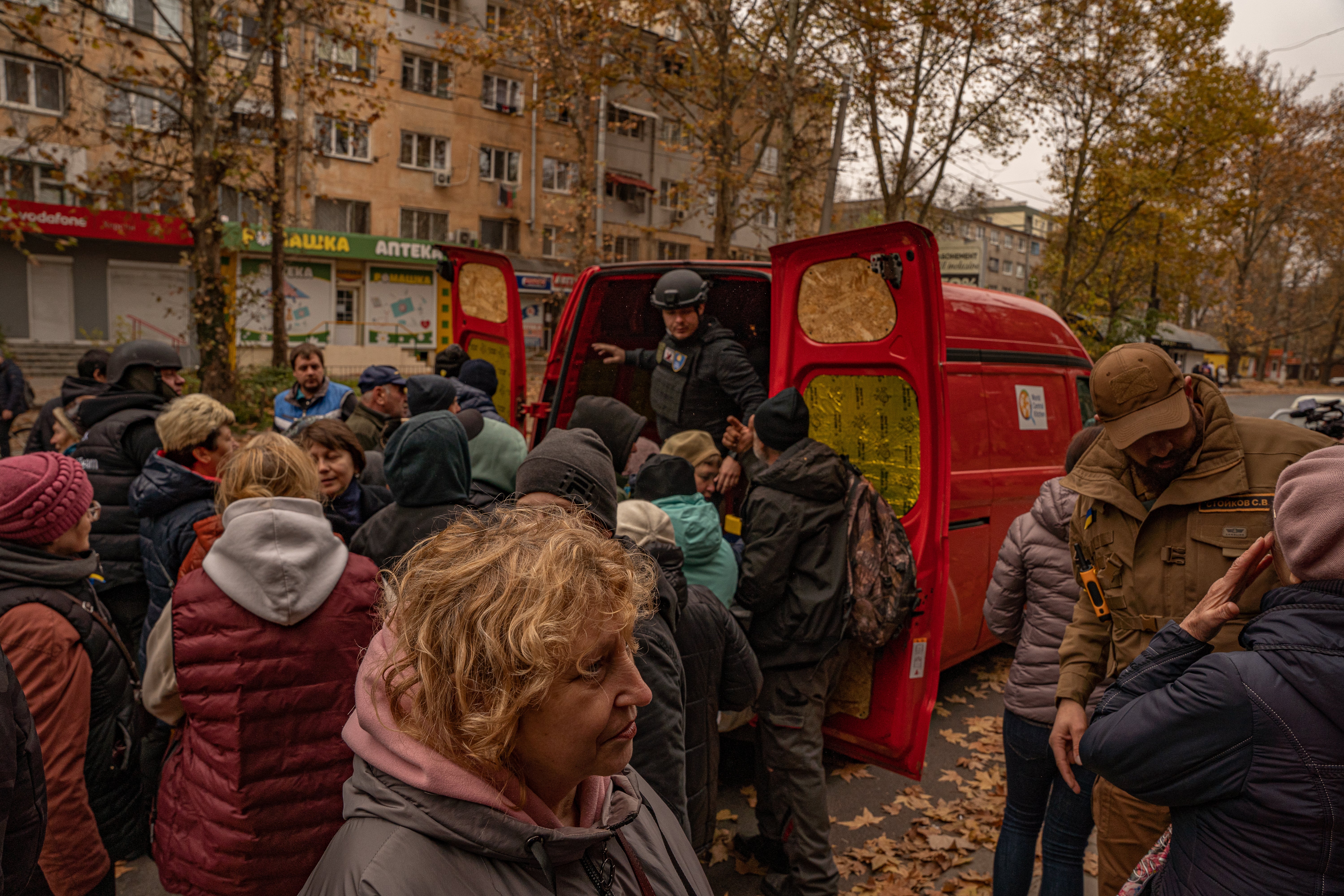
Across Kherson city, residents – wielding Ukrainian flags and flowers – have emerged from their homes to welcome Kyiv’s triumphant soldiers, who first entered the suburbs of the city on Friday.
In the face of a successful Ukrainian counteroffensive, Russia ordered a complete withdrawal of its positions on the west bank of the Dnipro river, which cuts the strategic region in half.
This marked a potentially devastating defeat for the Kremlin, which just two months ago “annexed” Kherson in a glittering ceremony in Moscow, declaring it and three other regions would remain “Russian forever”.
Kherson city was the last regional capital Moscow had captured and held since the start of the invasion in February. It is the jewel of the Kherson oblast, which Russia claimed early on in the war as a strategic land bridge to Crimea, which president Putin illegally annexed in 2014.
Now that land grab is in jeopardy. On Friday Moscow said it had completed the evacuation of 30,000 troops to the east bank of the Dnipro without losing “a single soldier”.
But Ukrainians painted a picture of a chaotic retreat, with Russian troops dropping weapons and even drowning while trying to flee.
Soldiers in Kherson said they had found rubbish bins stuffed with discarded Russian uniforms as soldiers left them behind and tried to pose as civilians.
An operation is under way to root them out.
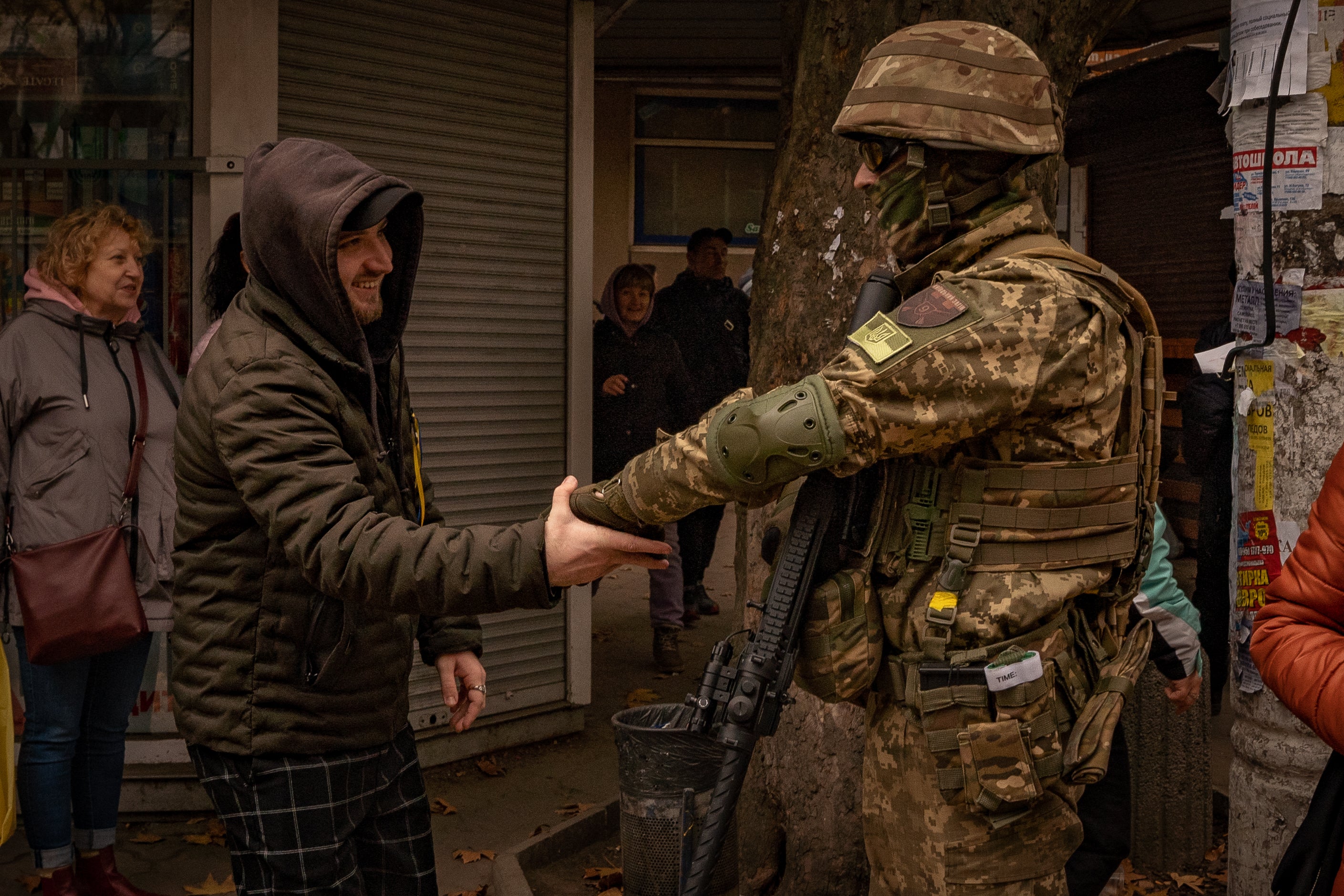
On Sunday Kherson was closed for “filtration”, a process by which the Ukrainian authorities hope to identify suspects.
Stanislav Stoikobv, head of territorial defence in the region, told The Independent the military estimated that as many as 15 per cent of Moscow’s troops stationed in Kherson had been left behind.
“We have to find them. They have no contact with Russian troops on the other side of the river,” he said.
“We are concerned Russia will start heavily shelling Kherson, but we are not panicking.
“We need the second half of Kherson and we will get it soon,” he added.
The road to Kherson is a haunted one. The city itself remains comparatively unscathed, but shipwrecked villages and snarled remains of vehicles edge the main highway from Mykolaiv, which is pockmarked by spent rockets.
These areas were the worst hit by ferocious artillery fire and the worsening humanitarian crisis.
In Kyselivka village, 30 miles north of Kherson, one man said even getting basic goods was hard at times, as he gratefully accepted a parcel of food aid from WCK.
“When the war started we couldn’t get bread; we were desperate,” he said.
“We had to tell our children ‘we don’t have any’.”
In another suburb, Victor, 62, said the shelling was relentless and people feared the Russians might hit harder now they had retreated.
“We are worried about the future.”
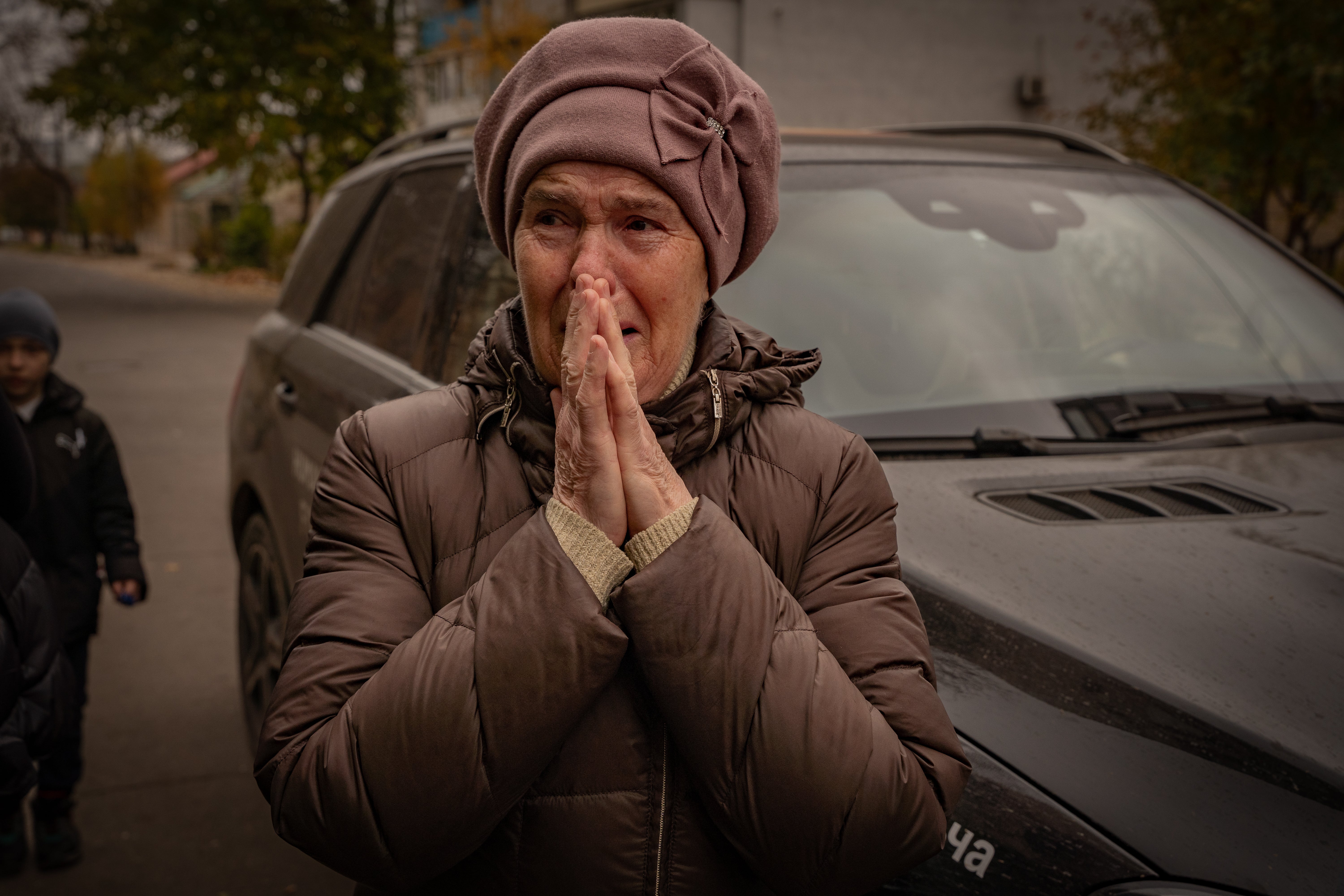
Back in the city centre, Olha, 63, said the hardest part of the occupation was the isolation: she had been separated from her daughter for nine months. Occupied Kherson was closed off from the rest of Ukraine by the Russians, who controlled access to the internet. For months they had had no electricity, water or gas supplies, infrastructure that president Volodymyr Zelensky claimed Russia had deliberately targeted as its soldiers left.
Aside from security concerns, utility companies and the authorities are racing to re-establish power, water and gas supplies.
Aid groups such as WCK, meanwhile, have begun entering the city to try to feed communities.
Yuliya Konovalova, the WCK’s regional coordinator for southern Ukraine, who before the war ran a health food delivery service, said WCK aimed to start sending hot meals cooked in neighbouring Mykolaiv to Kherson as early as next week.
“We can’t prepare the food in Kherson until the electricity and water are back,” she said.
“But the people need food; they have just come out from under occupation. They had no jobs; food prices were rising. We need to help them.”
This is just one of many problems Kherson will face in the near future. Russian forces are located on the other side of the Dnipro, only a few kilometres away, so well within artillery range of the city.
The sound of shelling already echoes through the city. The military and residents alike fear Russia's strikes will only intensify as they consolidate their positions post-withdrawal.
“We are preparing our basements in case we have to live there over the winter if the shelling gets really bad,” Ludmilla said, as she collected a second bag of food aid to give to her neighbour, whose wife was killed in the fighting.
“We just don’t know what the future will hold for this city.
“We are so happy we are free, but we are afraid of what comes next.”
Join our commenting forum
Join thought-provoking conversations, follow other Independent readers and see their replies
Comments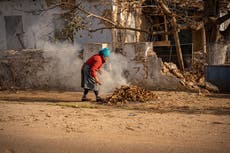
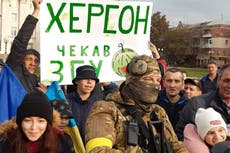

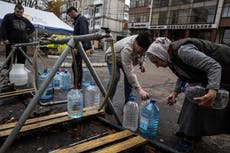
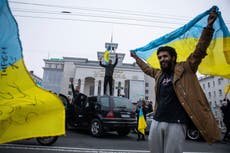
Bookmark popover
Removed from bookmarks